A day in the life of a community engagement officer in Sierra Leone
Mohamed Turay is a community engagement officer working with The Water Project in Sierra Leone. We asked him to describe what a typical day looks like for him, from life at home to working with communities to support access to safe water. This is his story, in his words.
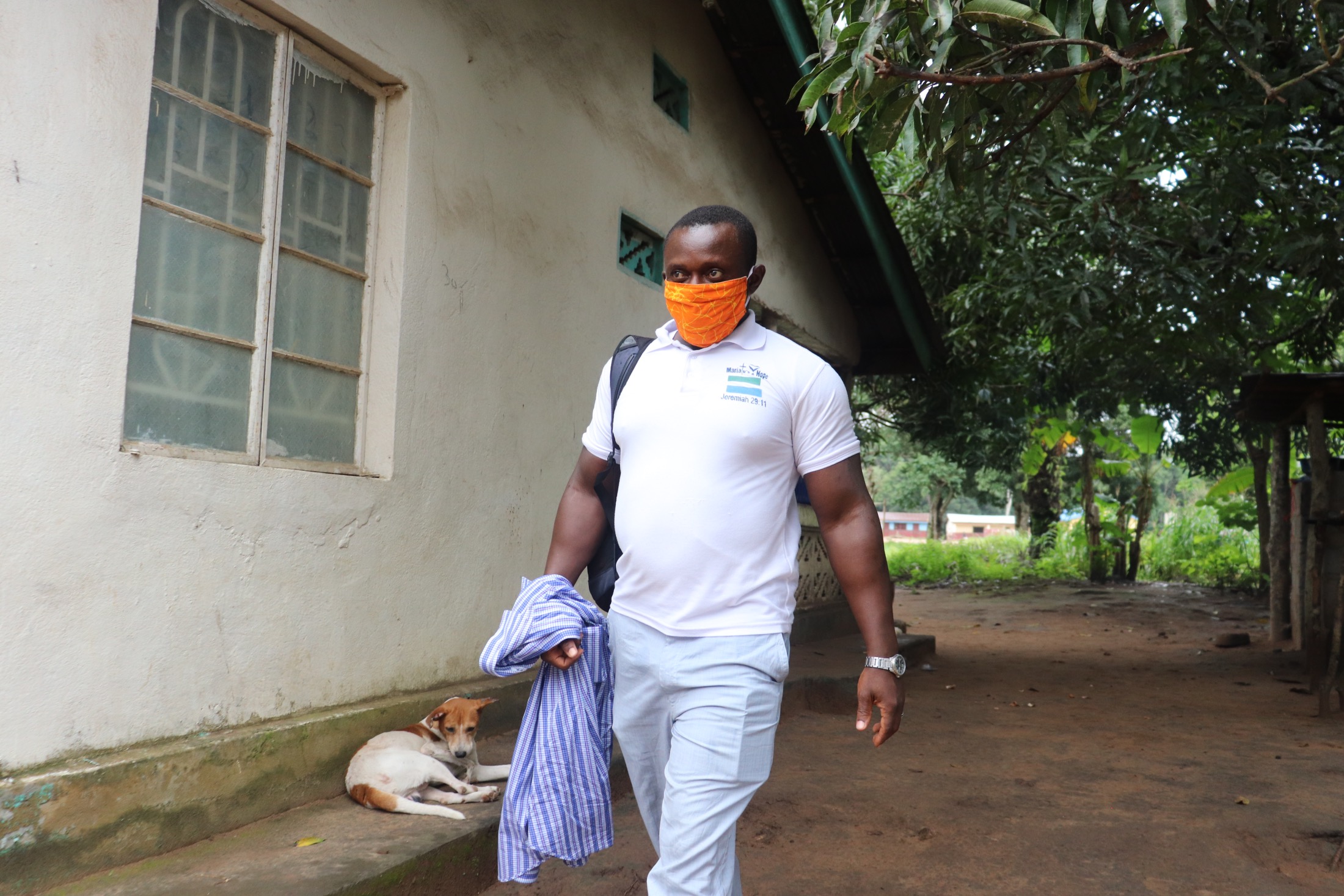
Mohamed home leaving for work
Growing up with a routine-oriented father, I am used to getting up at 4 am in morning. Now I do it because it has become a habit, and instead of wasting that time early in the morning, I have used it to empower myself by working out in a small section of my rented home. I would spend an hour in the morning to exercise and by 5 am, my little boy Ibrahim who is one year and seven months wakes up and joins me in the living room for his daily dose of cartoon movies. A great way of teaching children to speak English, like father like son, those movies improved my way of speaking English for the better. I have fond memories of watching cartoons, not blinking, not missing a sentence. I watch both my children when watching children’s films. The focus, the occasional moving lips trying to mimic the words and actions, a big smile comes to my face, and I breathe a sigh of relief, knowing everything will be fine.
I leave the children in the living room while I warm up my left-over rice and sauce, which is necessary for every person born and raised in Sierra Leone. I never had the luxury of using a gas stove until a few years back when I could afford one for the early morning cooking and boiling of water. Most families must settle for using firewood or charcoal, which fills the home with smoke. Inhaling the smoke is not healthy for anyone, especially children.
My little girl was trained to wash and dress from the age of 3 years, and it has become a routine and habit for her. Every night she packs her school bag, makes sure her uniform is clean and ironed with matching socks and undervest. We live in a rented house with a pit latrine. Because of my little girl and wife, I purchased a pour flush toilet with a plastic seat to prevent a child from falling inside the pit.
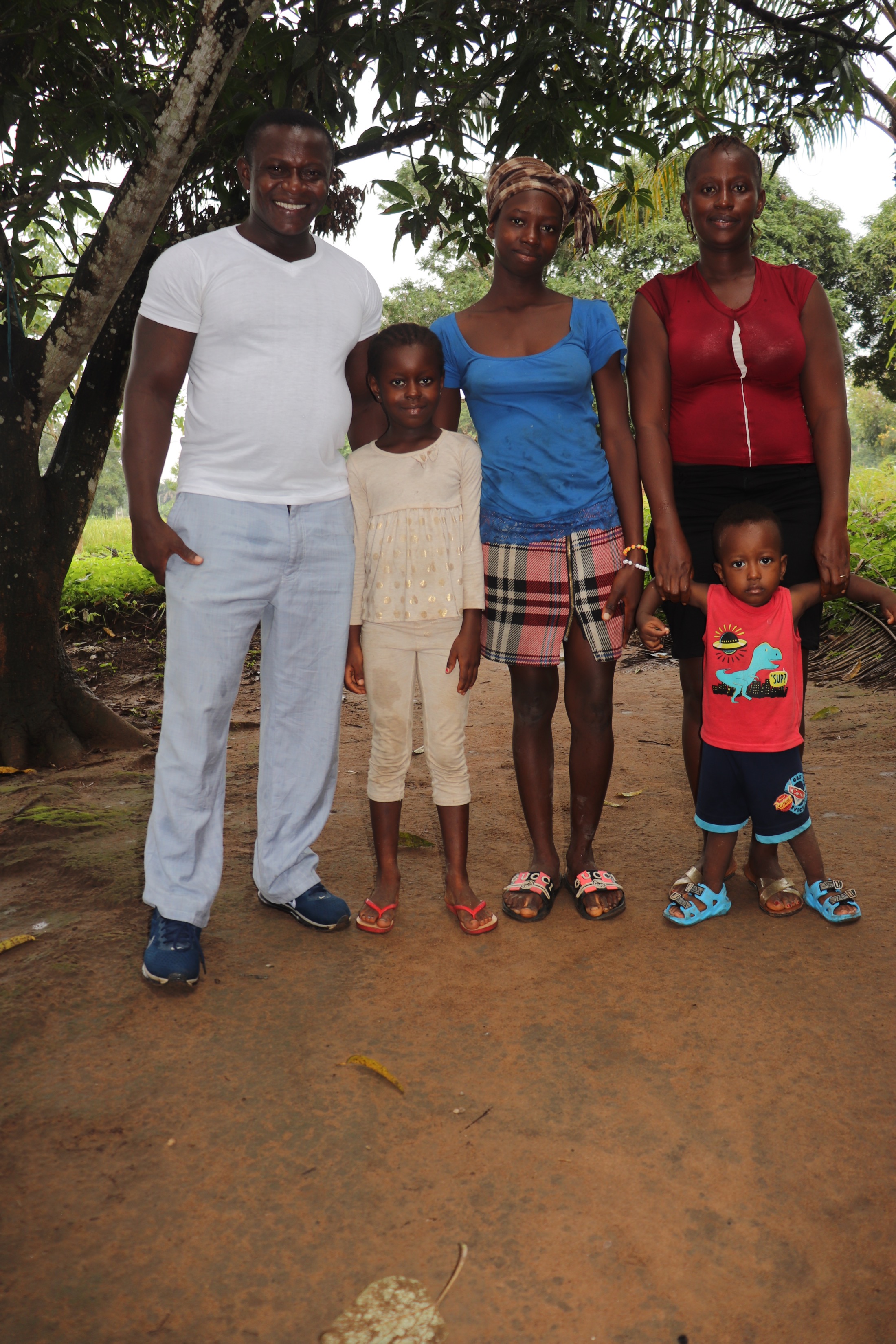
Mohamed with his famil
By 7 am, I have eaten my rice and sauce and am ready to start my day. I must hide from my little boy, or else he will cry seeing me leaving for work. His mother takes him away. Over time, he has gotten used to the routine. The moment he sees me putting on my clothes, he immediately raises his hands to be carried by me and refuses the efforts of his mother to distract him with breast milk.
I used to wait for a taxi, but the long wait has changed my routine to using a hired and regular motorcycle rider to take me to and from work every day. I agreed to pay monthly instead of the daily wages, which work out great for both of us. He always waits for me down the street from my home, all in the effort of escaping my son. With my helmet on my head, the rider knows how I prefer to ride, nice and slow until I arrive in one piece to the office.
By 7:15 am, I am at the office doorsteps safe and sound. I arrive early to avoid the dangerous morning traffic going to the ferry with speeding cars, trucks, and motorbikes heading to the capital city of Freetown. As a Community Engagement Officer, I am responsible for answering the office phone while I am in the office. I record all incoming calls with the name, time, and purpose. If it is for a non-functioning water point, I create a service visit form and enter it nonfunctional on the Mwater issues survey. I arrange my desk with blank service visit forms and the telephone logbook. By 7:45 am, I am seated in the conference room for our morning devotion. The devotion time is when we ask God for guidance and protection while we go about our day to perform our duties. After our prayers and discussions, we explain what was accomplished yesterday and what work is expected to be accomplished for that specific day to our supervisors. Each department head is asked to discuss and take notes on what is expected.
The prayers and discussions are completed no later than 9 am, and everyone with specific instructions is to make his or her way to the field or the various offices. As a Community Engagement Officer and the go-to person for meetings with government ministries and departments, I spend on a regular week 2 to 3 days attending meetings with responsibilities of my regular duties. A typical day starts by ensuring the Operations and Maintenance team has the necessary paperwork that they need before going out for repairs. For the tenth time in an hour, I looked at my work plan for the day to ensure that the drill team has deployed to a site and the necessary arrangements with the water user committee providing lodging for the team and cooking arrangements are squared away.
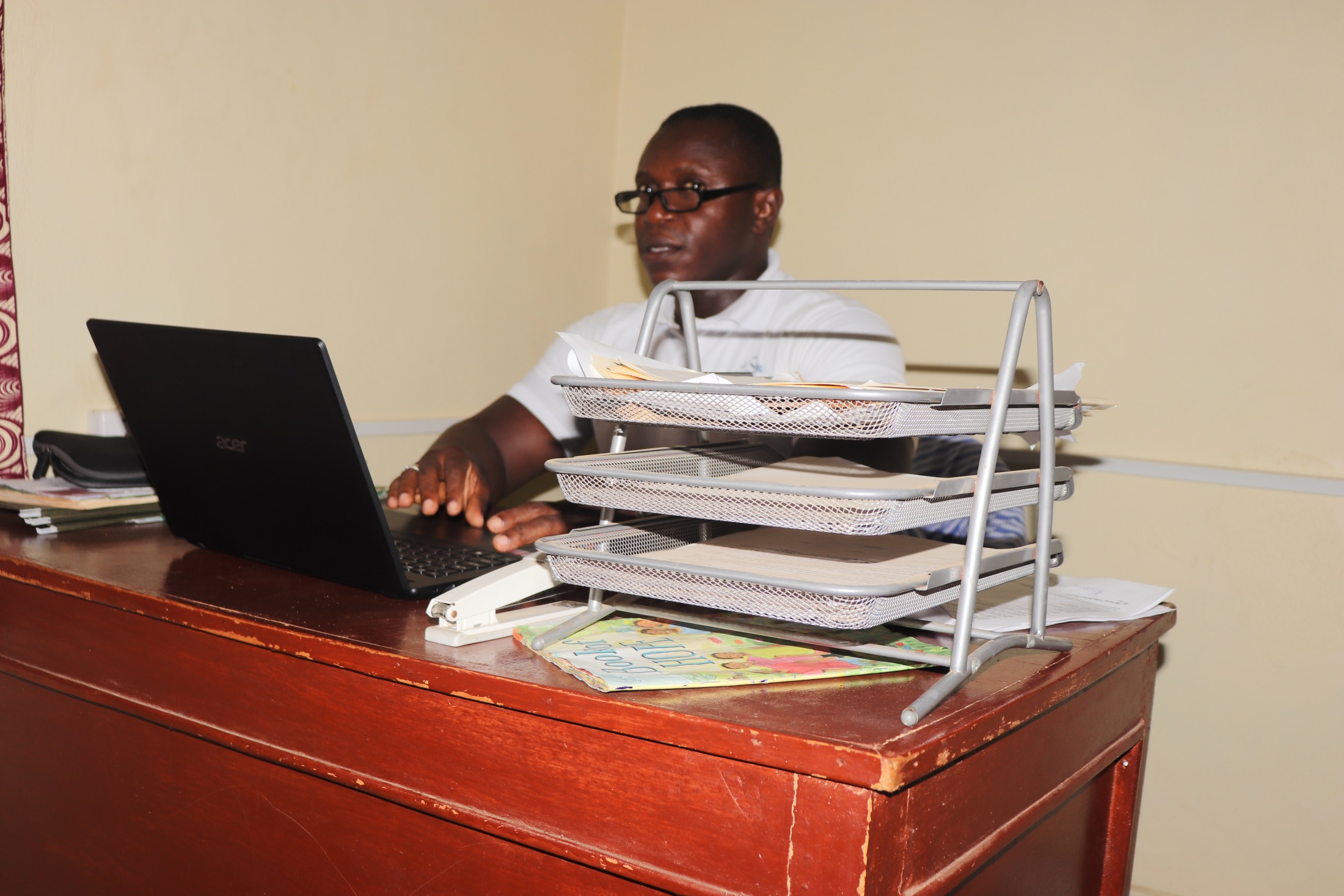
Working in the office.
As a Community Engagement Officer, I am the first to visit a community with the Chief Executive Officer or Country Director to assess and gather necessary and vital information before a team is sent out to conduct a baseline survey. I am always part of the team to conduct the survey, make sure all required pictures and required facilities are in the community and have all the information I need to write a compelling project proposal.
I come back into the community later to help and guide informing the water user committee. I read the entire constitution to the community and explain what every committee member and community is expected to do. Any successful project starts with a properly formed water user committee. The hygiene team is the next group to visit a site with a file in hand, with the newly elected committee by their peers. The team teaches a three-day PHAST (Participatory Hygiene and Sanitation Transformation) training. With a copy of the baseline survey information, they can see if the community has any changes to their previous sanitation and hygiene lapses.
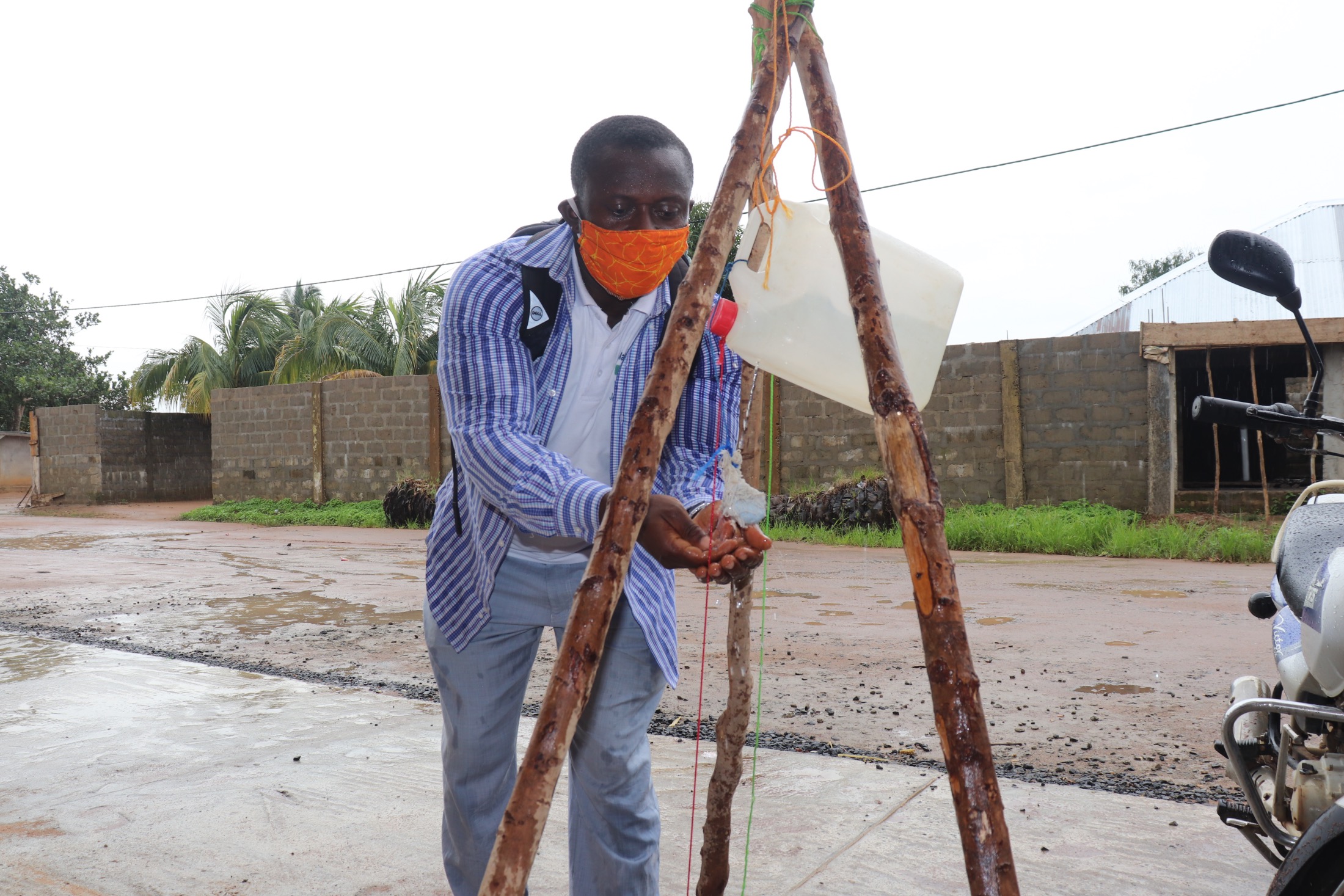
Mohamed demonstrates using a tippy tap handwashing station.
After the three days of training, I make a follow-up visit to see if the community has made lasting changes. I once again call the committee members and make a complete walk around the community as a whole if all conditions are met. If they are satisfied, GPS coordinates are taken for a most suitable site, presumably selected, and landowner agreements are made with the consent of all landowners. The land documents are taken to the headman, section chief, and lastly to the Paramount Chief for endorsement.
With all conditions met, I work on the project proposal with the baseline survey information and ensure all the required pictures are in the drive before submitting the project proposal. I take the community contact and committee information to share with the drill team. I also include information about lodging and who will prepare the food for the team when they are working on a project. I take a drive to the site with the drill team leader and make proper introductions to all committee members, and the place set aside for the team is shown to the team leader for approval.
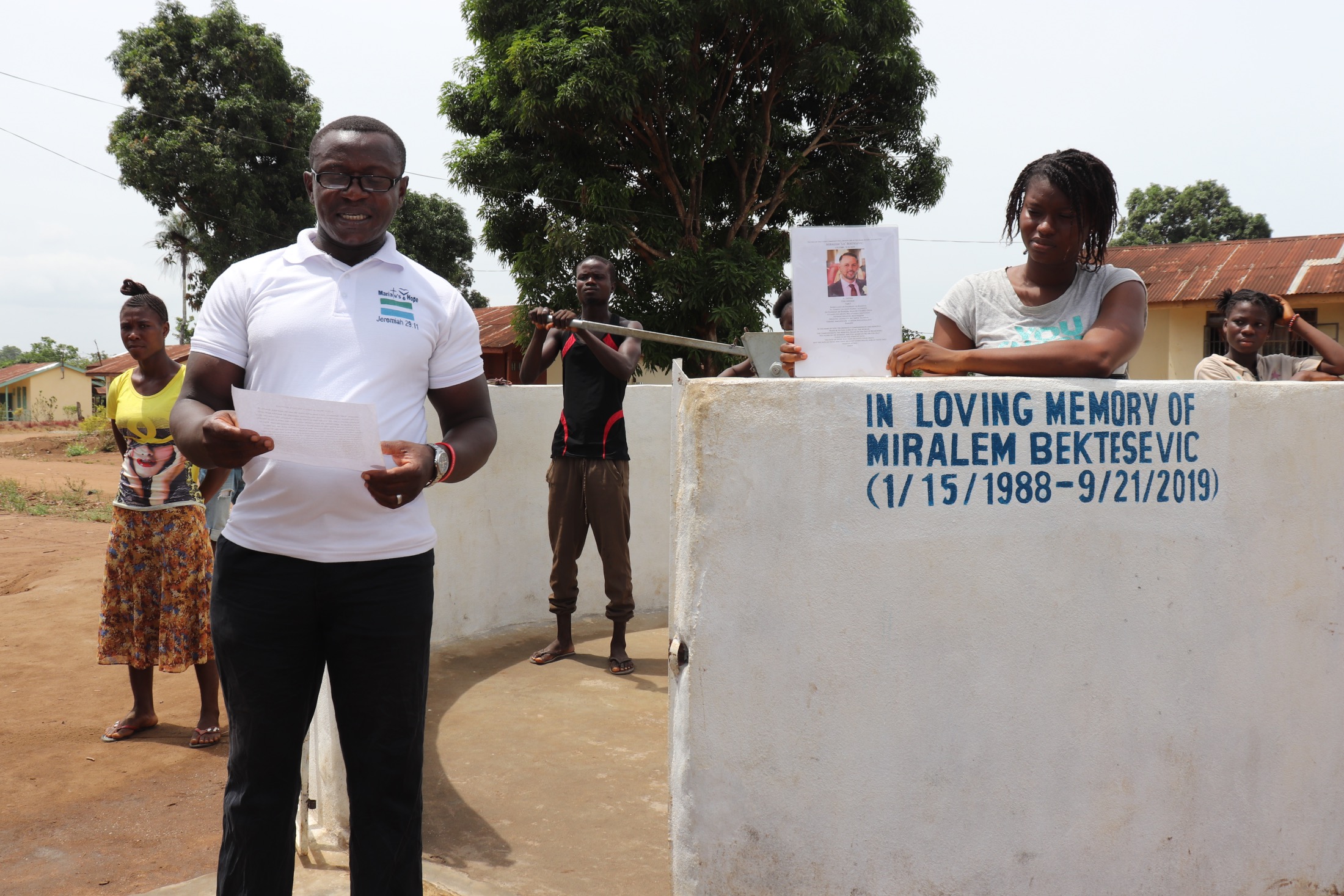
Mohamed visits a well as a part of his follow-up engagement work.
The drill team deploys, work is started and completed, and then the drill log is passed to me to write the final report. I also collect the hygiene report and include that in the final report. At the dedication or handing over ceremony, I time how long it takes to fill a 20-liter rubber bucket. After the dedication ceremony, I complete the final report and update all the information on the file checklist. The dedication date is significant because six months is the grace period for a new well. That period is used to allow the community to gather water user fees for future repairs and any replacements of parts within the six months is at no cost to the community.
At 5 pm is time for me to return home, it usually takes me 15 minutes to return home, and any minute on top of that, I receive a call from my wife to see if everything is okay. Standing at the side of the road is my family and stray dogs that I take care of waiting for me to get off the motorbike. Nothing is more rewarding than the smiles of my family and the wagging of tails welcoming me home. That gives my life a purpose. I have people and animals that depend on me coming home, making it possible for them to survive.
Home More Like ThisTweet